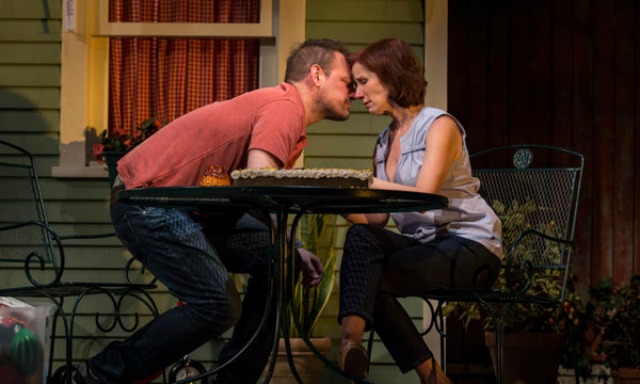'Rapture, Blister, Burn' Sizzles At The Goodman
By Melody Udell in Arts & Entertainment on Feb 2, 2015 8:30PM

'Rapture, Blister, Burn' at the Goodman.
“You two aren’t very good feminists. You’re always complaining and worrying about boys.”
So says 70-something widow Alice (Mary Ann Thebus), who’s perhaps the only character in Gina Gionfriddo’s sharp, bracingly funny play with a rock-solid set of convictions. Antiquated, sure, but no one can argue that she doesn’t know where she stands. The women Alice is accusing—her career-driven, 40-year-old daughter, Catherine, and Catherine’s millennial-age pupil-of-sorts, Avery—aren’t as taken aback at the notion of a “good feminist” as they would’ve been, perhaps, much earlier in the play, before messy webs of love and loneliness started to untangle.
At its core, Rapture, Blister, Burn isn’t solely a play about women’s equality, a fount of feminist theory or even a debate about stay-at-home-moms versus untethered career-seekers. It is all of those things, of course, but above all, Gionfriddo’s exceptionally well-written play expounds upon the idea that women today have more choices than ever before. And you know what? Sometimes they make the wrong ones.
Take Catherine (Jennifer Coombs), for example. She seems like the poster child for women’s lib. In grad school she left for a year abroad in London, leaving her boyfriend, Don (Mark L. Montgomery), back in the U.S. After returning home Catherine forged a high-level career as an academic, writer and sought-after political pundit, while Don carved out a life in small-town New England with a low-stakes job as a college advisor, two kids and a wife—Catherine’s former roommate, Gwen (Karen Janes Woditsch). But the never-married Catherine, who takes a work sabbatical after her mom has a heart attack, returns to town and finds herself falling back in love with Don, despite the fact that Don is no longer the Walt-Whitman-spouting lover from her youth. Instead, he’s a slovenly, porn-addicted pothead who does the bare minimum to support his family. Why, then, is Catherine attracted to him? Gionfriddo doesn’t answer the question, but instead poses another one: Why can’t Catherine be attracted to him? Smart, driven women who should, for lack of a better term, “know better,” are still prone to the folly of physical and emotional attraction. And if there’s anything that Gionfriddo is teaching us, it’s that feminism—and women, themselves—shouldn’t be limited to black or white characterization.
Gwen, on the other hand, dropped out of grad school and became a stay-at-home mom to her and Don’s two children. In effect, it seems like Gionfriddo has positioned her as the antithesis to modern-day feminist ideals—and there’s plenty of dialogue spent deriding her lifestyle choice, especially from Avery (the caustic Cassidy Slaughter-Mason), whose own youth-empowered theories about love and men serve as a sort of funhouse mirror for Catherine and Gwen. But the two women, both realizing that there is something missing from their lives, take an extreme step and essentially swap lives, or at least elements of it, to get what the other has—a family for Catherine and independence for Gwen.
Kimberly Senior, fresh from directing Disgraced on Broadway, hones in on Gionfriddo’s whip-smart banter, which helps lighten a show that’s fraught with heavy themes. And despite how zany Catherine and Gwen’s plan seems, Senior’s sharp direction helps prevent the premise, thankfully, from sounding like an episode of Wife Swap.
It’s not a spoiler to say that Catherine and Gwen’s plan is short-lived and it’s difficult to say that the two are better off because of it. But no one is exempt from the occasional lapse in judgment and impetuous decision-making. When helping Catherine face her regrettable choices and the consequences thereof, Alice, once again, says it best: “Own your own misspent live. Don’t victimize women who made the other choice.”
The show runs through Sunday, Feb. 22 at the Goodman, 170 N. Dearborn, 312-443-3800 or online.